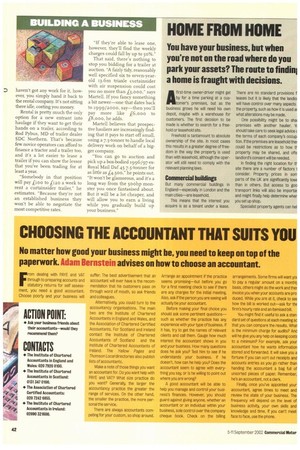CHOOSING THE ACCOUNTANT THAT SUITS YOU
Page 42

If you've noticed an error in this article please click here to report it so we can fix it.
No matter how good your business might be, you need to keep on top of the paperwork. Adam Bernstein advises on how to choose an accountant.
From dealing with PAYE and VAT through to preparing accounts and statutory returns for self assessment, you need a good accountant. Choose poorly and your business will
suffer. The best advertisement that an accountant will ever have is the recommendation that his customers pass on through word of mouth, so ask friends and colleagues.
Alternatively, you could turn to the accountancy organisations. The main two are the Institute of Chartered Accountants in England and Wales, and the Association of Chartered Certified Accountants. For Scotland and Ireland contact the Institute of Chartered Accountants of Scotland and the Institute of Chartered Accountants of Ireland, The Yellow Pages and Thomson Loco/directories also publish lists of accountants, Make a note of those things you want an accountant for. Do you want help with PAYE and VAT? What size practice do you want? Generally, the larger the accountancy practice the greater the range of services. On the other hand, the smaller the practice, the more personal the service.
There are always accountants competing for your custom, so shop around. Arrange an appointment if the practice seems promising—but before you go for a first meeting check to see if there are any charges for the initial meeting. Also, ask if the person you are seeing will actually be your accountant.
Before making your final choice you should ask some pertinent questions— such as whether the practice has any experience with your type of business. If it has, try to get the names of relevant clients and call them. Gauge how much interest the accountant shows in you and your business. Flow many questions does he ask you? Test him to see if he understands your business. If he doesn't, how can he help you? Does the accountant seem to agree with everything you say, or is he willing to point out where you are wrong?
A good accountant will be able to help you manage and control your business's finances. However, you should guard against giving anyone, whether an accountant or an individual within your business, sole control over the company cheque book. Check on the billing arrangements. Some firms will want yoi to pay a regular amount on a monthl basis, others might do the work and trier invoice you when your accounts are pro duced. While you are at it, check to set how the bill is worked out—ask for thr firm's hourly rate and an itemised bill.
You might find it useful to ask a sten. dard set of questions at each meeting sc that you can compare the results. What is the minimum charge for audits? And will he give you any help on keeping costs to a minimum? For example, ask your accountant how he wants information stored and forwarded. It will save you a fortune if you can sort out receipts and accounts entries as you go rather than handing the accountant a bag full of unsorted pieces of paper. Remember, he's an accountant, not a clerk.
Finally, once you've appointed your accountant, agree times to meet and review the state of your business. The frequency will depend on the level of business activity, your own skills and knowledge and time. If you can't meet face to face, use the phone.




























































































































































